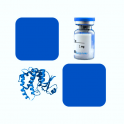
- Remove this product from my favorite's list.
- Add this product to my list of favorites.
Products
Newsletter
 |  |  |  |  |  |

Background
4-1BB, also known as CD137, tumor necrosis factor receptor superfamily member 9 (TNFRSF9), induced by lymphocyte activation (ILA), is a co-stimulatory molecule of the tumor necrosis factor (TNF) receptor superfamily. CD137 can be expressed by activated T cells, but to a larger extent on CD8 than on CD4 T cells. In addition, CD137 expression is found on dendritic cells, follicular dendritic cells, natural killer cells, granulocytes and cells of blood vessel walls at sites of inflammation. The best characterized activity of CD137 is its costimulatory activity for activated T cells. Crosslinking of CD137 enhances T cell proliferation, IL-2 secretion survival and cytolytic activity. Further, it can enhance immune activity to eliminate tumors in mice. CD137 can enhance activation-induced T cell apoptosis when triggered by engagement of the TCR/CD3 complex. In addition, 4-1BB/4-1BBL co-stimulatory pathway has been shown to augment secondary CTL responses to several viruses, and meanwhile augment anti-tumor immunity. 4-1BB thus is a promising candidate for immunotherapy of human cancer. CD137 has been shown to interact with TRAF2.
Source
Recombinant Biotinylated Human 4-1BB, His,Avitag (41B-H82E6) is expressed from human 293 cells (HEK293). It contains AA Leu 24 - Gln 186 (Accession # Q07011-1).
Predicted N-terminus: Leu 24
Molecular Characterization
This protein carries a polyhistidine tag at the C-terminus, followed by an Avi tag (Avitag™).
The protein has a calculated MW of 20.9 kDa. The protein migrates as 30-35 kDa when calibrated against Star Ribbon Pre-stained Protein Marker under reducing (R) condition (SDS-PAGE) due to glycosylation.
Biotinylation
Biotinylation of this product is performed using Avitag™ technology. Briefly, the single lysine residue in the Avitag is enzymatically labeled with biotin.
Biotin:Protein Ratio
Passed as determined by the HABA assay / binding ELISA.
Endotoxin
Less than 1.0 EU per μg by the LAL method.
Purity
>90% as determined by SDS-PAGE.
>90% as determined by SEC-MALS.
Formulation
Lyophilized from 0.22 μm filtered solution in PBS, pH7.4 with trehalose as protectant.
Reconstitution
Please see Certificate of Analysis for specific instructions.
For best performance, we strongly recommend you to follow the reconstitution protocol provided in the CoA.
Storage
For long term storage, the product should be stored at lyophilized state at -20°C or lower.
Please avoid repeated freeze-thaw cycles.
This product is stable after storage at:
-20°C to -70°C for 12 months in lyophilized state;
-70°C for 3 months under sterile conditions after reconstitution.
Bioactivity
Please refer to product data sheet.
(1) "Efficacy and safety of anti-CD19 CAR-T in a mouse model of IgG4-related disease"
Sun, Huang, Zhang et al
Int Immunopharmacol (2024) 145, 113779
(2) "Preclinical Evaluation and Pilot Clinical Study of CD137 PET Radiotracer for Noninvasive Monitoring Early Responses of Immunotherapy"
Cheng, Ge, Song et al
J Nucl Med (2024)
(3) "Intratumoral delivery of lipid nanoparticle-formulated mRNA encoding IL-21, IL-7, and 4-1BBL induces systemic anti-tumor immunity"
Hamouda, Filtjens, Brabants et al
Nat Commun (2024) 15 (1), 10635
Showing 1-3 of 1878 papers.
Follow us